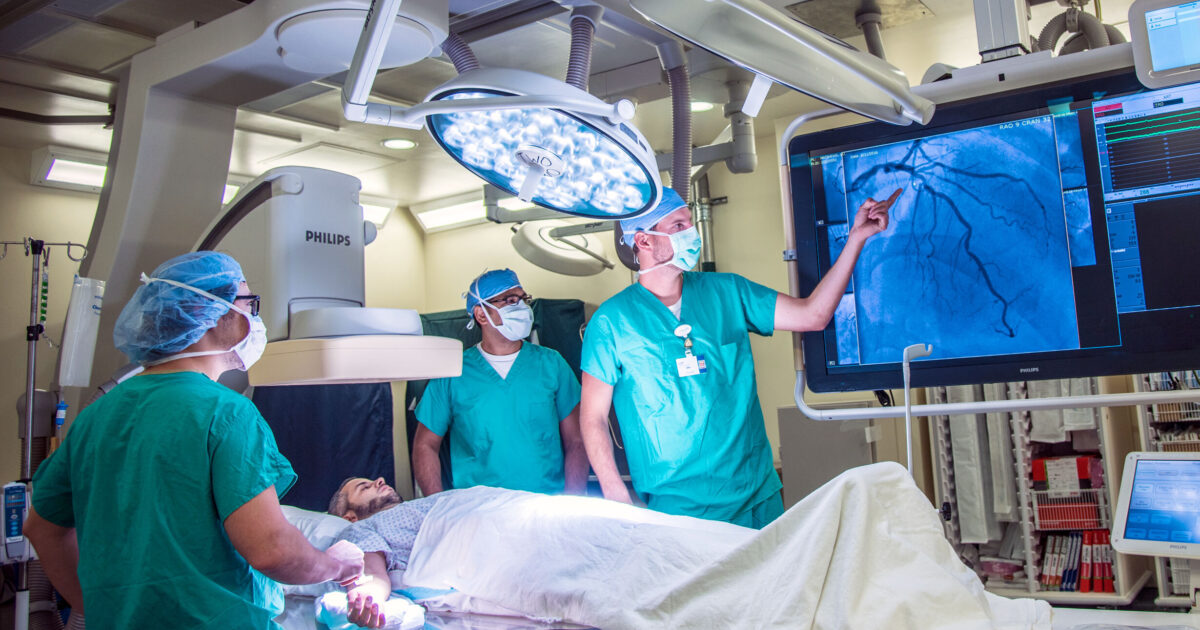What does a Cardiologist do? Cardiology demystified
What does a Cardiologist do? Cardiology demystified
Blog Article
Comprehending the Relevance of Cardiology in Modern Medical Care Solutions
Cardiology plays an essential function in modern-day medical care, specifically as cardiovascular disease remains to be the leading root cause of mortality worldwide. Advances in diagnostics and treatment have actually transformed patient treatment, allowing earlier interventions and improved outcomes. The shift in the direction of preventive cardiology encourages people to manage their wellness proactively. As modern technology continues to progress, the combination of ingenious solutions might additionally redefine cardiology's effect on public health and wellness, prompting a more detailed exam of arising trends and their effects.
The Occurrence of Cardiovascular Disease and Its Effect on Public Wellness
Heart illness stays the leading reason of death around the world, its influence prolongs much beyond private clients to influence public health systems and economic situations. The high prevalence of cardiovascular disease positions a substantial stress on medical care resources, necessitating boosted financing for treatment, prevention, and recovery programs. Public wellness campaigns must deal with danger factors such as obesity, smoking cigarettes, and sedentary way of lives, which contribute considerably to the rising incidence of heart conditions.Moreover, the financial concern connected with heart illness is enormous, including not just straight clinical prices but also indirect expenses associated with lost productivity and early mortality. Communities deal with difficulties in taking care of these prices, frequently causing differences in medical care access and results. As the population ages and lifestyle-related dangers continue to escalate, the urgency for effective cardiology treatments comes to be extremely important. Consequently, dealing with cardiovascular disease is not just an issue of private health but also a crucial public health top priority.
Developments in Cardiac Diagnostics and Imaging Techniques
Recent innovations in heart diagnostics and imaging strategies have revolutionized the area of cardiology, enhancing the capacity to spot and monitor heart diseases. Strategies such as heart MRI, CT angiography, and echocardiography have come to be increasingly innovative, offering comprehensive photos of cardiac frameworks and functions. These methods enable the very early identification of problems like coronary artery illness, cardiac arrest, and valvular disorders.Moreover, innovations in non-invasive diagnostics, such as wearable technology and remote tracking devices, have actually encouraged patients and doctor. These tools assist in real-time tracking of heart rhythms and other crucial indicators, leading to timely treatments. Furthermore, expert system is being incorporated into imaging analysis, enhancing precision and effectiveness in diagnosis.
Technologies in Therapy Choices for Heart Conditions
Current advancements in cardiology have actually caused significant technologies in treatment alternatives for heart conditions. These consist of advanced medical strategies that improve procedural end results and arising medicines that provide new methods for treatment. As the field evolves, these technologies play a crucial function in improving person care and end results.
Advanced Surgical Techniques
Developments in surgical methods have actually changed the landscape of cardiology, offering brand-new wish for people with heart problems. Minimally invasive procedures, such as catheter-based interventions, have actually greatly lowered recuperation times and health center stays. Techniques like robotic-assisted surgical treatment improve accuracy, permitting cosmetic surgeons to browse complicated anatomical structures with better precision. Improvements in imaging innovation facilitate real-time visualization throughout procedures, improving end results. Transcatheter aortic shutoff replacement (TAVR) exhibits a development in dealing with aortic stenosis, enabling shutoff substitute without open-heart surgical procedure. Additionally, hybrid approaches that combine catheter-based and medical methods provide customized options for numerous heart problems. These advanced medical methods not only enhance patient safety yet also broaden treatment choices, highlighting the vital role of technology in modern-day cardiology practices.
Emerging Therapies and drugs
As the landscape of cardiology continues to advance, arising treatments and medicines play a crucial function in boosting treatment alternatives for heart conditions. Developments such as unique anticoagulants and advanced lipid-lowering representatives have changed the administration of heart diseases, considerably decreasing person morbidity and death. Additionally, the development of gene treatments and regenerative medicine uses promising avenues for dealing with problems previously regarded permanent. Clinical trials are consistently revealing the efficacy of these therapies, pressing the boundaries of standard therapies. The assimilation of digital health and wellness modern technologies facilitates customized medication, permitting for customized treatment strategies based on hereditary and lifestyle aspects. Jointly, these innovations underscore the dynamic nature of cardiology, enhancing individual end results and redefining standards of treatment in modern-day healthcare.
The Role of Preventive Cardiology in Patient Care
Precautionary cardiology plays a necessary duty in individual care by concentrating on the identification of risk aspects that add to heart disease. Via way of living alteration strategies and early discovery methods, doctor can successfully lower the occurrence of cardio occasions - Dr Garcia. This proactive approach not just boosts person end results yet likewise promotes long-term health
Threat Aspect Identification
While heart diseases continue to be a leading reason for morbidity and mortality worldwide, effective threat aspect identification serves as a keystone of preventative cardiology. Determining risk variables such as high blood pressure, family members, hyperlipidemia, and diabetic issues history is essential for very early intervention. Medical care experts utilize different screening approaches to assess these variables, permitting customized safety nets. Furthermore, understanding an individual's lifestyle selections, such as smoking and physical lack of exercise, further notifies risk evaluations. This thorough examination enables clinicians to create customized treatment strategies targeted at mitigating dangers. By focusing on risk aspect recognition, healthcare systems can improve person outcomes and minimize the total burden of heart diseases, ultimately contributing to enhanced public wellness strategies and resource allowance.
Way Of Living Modification Techniques
A wide variety of researches highlights the crucial function of way of life alteration approaches in reducing cardiovascular illness danger. These methods incorporate nutritional adjustments, increased exercise, Extra resources smoking cessation, and weight administration. By embracing a heart-healthy diet plan abundant in fruits, vegetables, whole grains, and lean proteins, individuals can reduce cholesterol levels and high blood pressure. Routine exercise enhances the heart and enhances general cardiovascular health and wellness. Furthermore, stopping cigarette smoking greatly reduces the risk of cardiovascular disease and boosts recuperation prices for those with current conditions. Weight administration even more contributes to cardio wellness by alleviating various other risk factors such as diabetes and high blood pressure. Carrying out these way of life changes not only advertises private well-being but additionally acts as a foundation of preventive cardiology in person treatment.
Early Discovery Methods
Way of life modifications substantially add to decreasing cardio condition risks, yet they are most efficient when coupled with early discovery methods. Preventative cardiology stresses the importance of identifying prospective heart problems before they escalate right into major problems. Techniques such as high blood pressure tracking, cholesterol testing, and advanced imaging modern technologies like echocardiograms play vital roles in reviewing cardiovascular wellness. Biomarkers and genetic screening additionally improve the accuracy of early discovery, enabling tailored preventative techniques. Normal cardiac danger evaluations equip doctor to interfere proactively, potentially stopping cardiovascular disease and strokes (Dr Garcia). By integrating these very early discovery methods into regular treatment, clients can take advantage of prompt lifestyle interventions and targeted treatments, inevitably boosting outcomes and improving lifestyle
Integrating Innovation Into Cardiology Practices
As innovations in technology continue to reshape different areas, the assimilation of cutting-edge tools and systems into cardiology methods has actually come to be essential for improving individual treatment and end results. Telemedicine systems permit cardiologists to keep track of clients remotely, enhancing accessibility to care while minimizing the problem on medical care centers. Wearable tools, such as smartwatches, make it possible for continual heart price surveillance, signaling both physicians and clients to potential issues in real-time. In addition, expert system (AI) is being made use of to examine substantial amounts of heart information, aiding in early medical diagnosis and personalized treatment plans. Advanced imaging techniques, consisting of 3D echocardiography, boost visualization of heart structures, resulting in much more precise treatments. Digital health and wellness records (EHRs) streamline person info administration, ensuring that cardiologists have prompt accessibility to vital data. With each other, these technical developments are transforming cardiology, advertising positive management and boosted health and wellness outcomes for individuals with cardiovascular problems.
The Significance of Patient Education and Interaction
Person education and involvement play a critical duty in the management of cardio wellness. By gearing up people with knowledge regarding their problems, treatment choices, and way of living adjustments, click to read doctor equip people to take an energetic role in their care. This aggressive approach can result in enhanced adherence to suggested medications, dietary modifications, and workout routines, inevitably reducing the danger of complications.Engagement likewise cultivates a solid patient-provider relationship, encouraging open communication and depend on. When people really feel educated and involved, they are much more likely to voice worries and ask inquiries, which can bring about better clinical outcomes. Additionally, academic resources, such as workshops or digital platforms, can improve understanding and promote self-management techniques. In general, prioritizing individual education and interaction is vital for enhancing cardio health and wellness, enhancing lifestyle, and minimizing health care expenses connected with heart diseases.
Future Trends in Cardiology and Their Potential Influence

Regularly Asked Concerns
What Way Of Life Changes Can Reduce Heart Problem Danger?
The present question addresses way of living modifications that can significantly reduce heart problem danger. Cardiology. Embracing a balanced diet regimen, engaging in normal exercise, keeping a healthy weight, try this website taking care of anxiety, and avoiding cigarette can significantly boost cardiovascular health
Just How Can I Recognize Very Early Signs of Heart Troubles?
Acknowledging very early signs of heart troubles involves surveillance symptoms such as upper body pain, lack of breath, fatigue, and uneven heart beat. Timely recognition of these indicators can trigger necessary clinical evaluation and intervention for far better outcomes.
What Are the Distinctions In Between Cardiologists and Cardiac Surgeons?
The distinctions in between cardiologists and cardiac specialists lie in their functions; cardiologists largely diagnose and handle heart problems via non-invasive methods, while heart doctors perform surgical treatments to correct structural heart problems. Each plays an essential, distinct role.

Just how Usually Should I Obtain My Heart Health And Wellness Checked?
The frequency of heart medical examination differs based upon individual risk variables. Normally, adults need to go through assessments every one to 2 years, while those with current problems might require even more regular analyses as encouraged by healthcare specialists.
What Function Does Genetics Play in Heart Problem Risk?
Genes significantly influences cardiovascular disease risk, with domestic patterns indicating acquired conditions. Certain genes can incline people to hypertension, cholesterol concerns, and other cardio problems, highlighting the relevance of genetic testing in evaluating heart health and wellness. Heart disease stays the leading reason of death around the world, its impact prolongs much beyond specific patients to impact public wellness systems and economies. Public health and wellness initiatives should resolve risk aspects such as excessive weight, smoking, and inactive way of livings, which contribute significantly to the climbing occurrence of heart conditions.Moreover, the economic concern linked with heart condition is immense, including not just straight clinical costs but likewise indirect costs related to lost efficiency and early death. Preventative cardiology plays an important function in individual treatment by concentrating on the recognition of threat factors that contribute to heart disease. Synthetic intelligence (AI) and maker understanding are boosting diagnostics and patient surveillance, enabling early detection of heart illness. The distinctions in between cardiologists and cardiac doctors exist in their duties; cardiologists mostly identify and handle heart problems via non-invasive approaches, while cardiac doctors execute medical procedures to deal with architectural heart issues.
Report this page